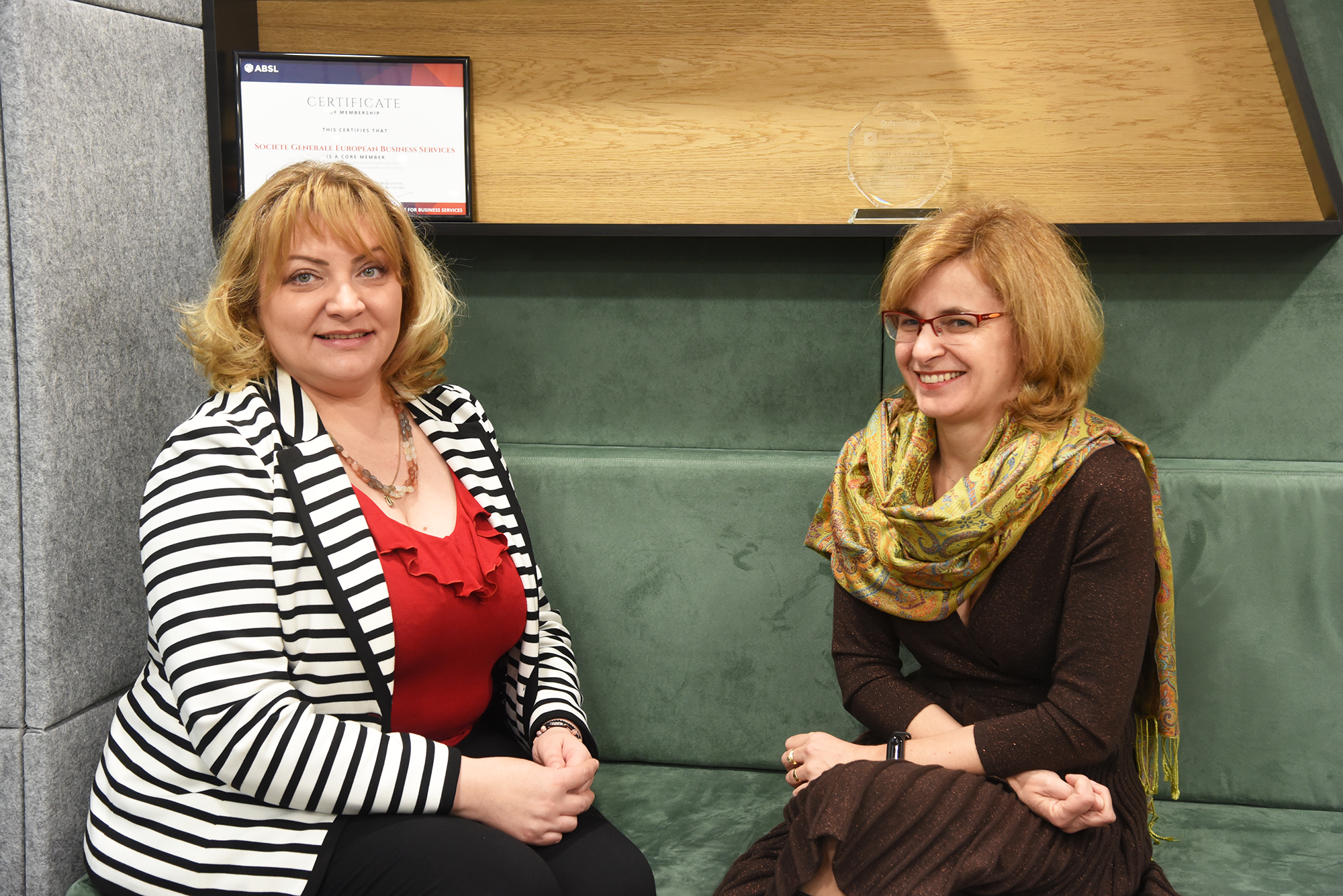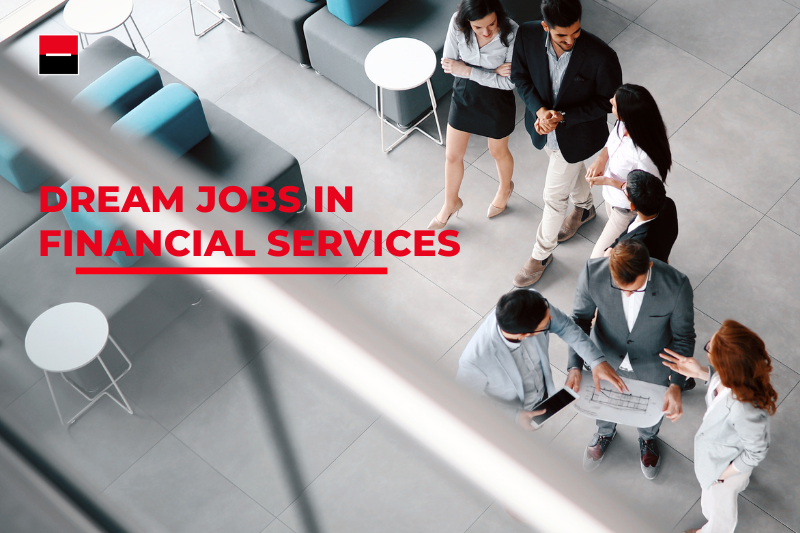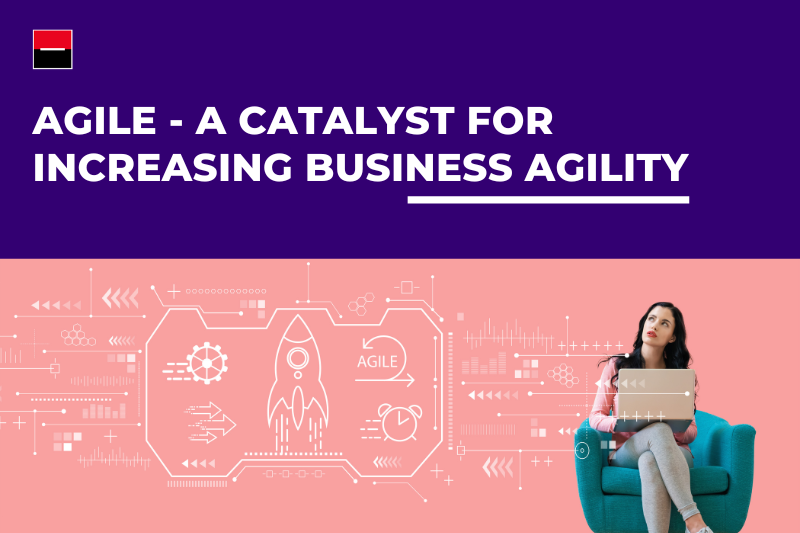Engine that drives human potential

Citește în continuare

Carmen Oprea – Catalina, you have joined the SG EBS team in 2012, the year of setting up the center dedicated to HR services. It was an important moment in the development of the company, the HR hub doubling the activities and the number of employees, shortly after the creation of SG EBS. Looking back to this period, how do you see the evolution of the company and the SSC HR team?
Cătălina Magui – Initially I did not expect I would make such a change – leaving a bank, after a long-term career in the field, and joining an entity newly established in the shared services industry. It was a major change for me, which I reflected deeply on, since leaving the banking system was an act of courage at the time. But I dared trying and I do not regret this decision. I certainly did not imagine the future development of the company, with so impressive gross figures: SG EBS has grown from 50 employees to over 2.500 today. Regarding the HR service center, the initial plans developed with the Group’s division were confirmed, but new ones we didn’t think of in 2012 have appeared. We are now offering HR services for more than 70.000 employees of the Group based mainly in Europe. Now when I look back, it is surprising to see the path SG EBS has walked on from year to year – new teams, new people, new activities, new processes. We even have lines of business and operations that we did not imagined in the beginning. It is an extraordinary evolution of both the teams and the organization. From a personal perspective, I could say that I have enjoyed the entire experience in SG EBS and I consider that I was lucky to have this chance, that came with lots of challenges, but also contributed to my development, in a dynamic environment.
Carmen Oprea – I also find myself in your story, and I admit that not many have the chance to grow up with the company they work for.
Cătălina Magui – Things have evolved very rapidly since then. I have lived the enthusiasm of growing the teams and the business, the energy that the new generally radiates, but at the same time, I had the satisfaction that something I have built remains after me. This is an energy that one generally encounters in projects. The development has been so strong, and the change has become a constant, that we must stop a little to get out of the permanent jure of daily activities, to capture the importance of what we have done. This discussion gives me such an opportunity – to stop and remember of the beautiful, valuable and full of energy moments.
Carmen Oprea – Within the SSC HR team, which currently has about 200 members, there are colleagues from the ’60 -’70 generation, but also very young colleagues from the millennial generation. Also, within these teams there are numerous employees who have joined the HR hub since its inception. What is the secret of this longevity and how does this diversity impact the way teams work?
Cătălina Magui – I think there are several topics that worth highlighted – some come from the specific context, the starting point, when the center took over some of the colleagues from BRD, people who had done HR in the Group for many years, and who have remained here. Then, as the center has developed, we have started recruiting more and more young people, some even at the beginning of the professional path. I think it’s a mix that comes from this historical context, but also from the specifics of the activities. HR professions can be done at any age, you don’t necessarily need 10-20 years of experience, but even if you have such experience, you can easily find your place with us. Going back to the specifics of the business, we are talking about a culture that allows everyone to find their place in the team. All these factors have made possible that in the same team coexist and work well together people from different generations. I personally would like to increase the diversity of the teams, I would like to attract more colleagues of 40+, but it is not always possible to find in the market and / or convince people over 40 to come to shared services area.
Carmen Oprea – Did the mix of age come naturally or did it come out because of specific managerial actions?
Cătălina Magui – It has appeared both natural, determined by the historical beginning of the HR hub, but both myself and the other colleagues from the management team encouraged its existence, because I think that the diversity offers balance and complementary competences to the teams. As I said, anyone can find the right role in SSC HR teams, regardless of experience or age level, and managers are open and willing to recruit and keep persons from different generations.
Carmen Oprea – The dynamism of the businesses and the speed with which they evolve are factors constantly present in the economic environment. How would you characterize the changes in the labor market in HR services over the last 5-10 years? How do these changes influence the way the teams work and interact?
Cătălina Magui – It is obvious that the HR processes, and not only, have evolved enormously – we recruit, motivate, retain people differently from 5-10 years ago. Currently, processes are deeply influenced by technology. The emphasis is shifting more and more from the classical traditional activities (recruitment –conclusion of employment contracts – data management – training organization) to new models, in which it is necessary to pay more attention to people, to devote time to them. We can save time by automating more and more the repetitive tasks. Coming to the question, to give HR specialists the time to take care of the people needs and evolution, it is important to make the processes work by themselves, industrially, as we say, and here the role of service centers is significant. The HR profession is completely changed now, and pressure to change comes from both market volatility and technological developments.
Carmen Oprea – Have you automated processes in the HR service center? If so, how much?
Cătălina Magui – Yes, we have automated significantly. I remember the past, when we took over the first activities, when the processes were not well defined, there were no management tools, no measurements or evaluations of KPI. We have taken huge steps in this direction, and the service center has been a real driver for many changes in the Group, because by taking over processes from several countries, we have discovered the strengths of each one, and then standardized and automated them, not only by using the Group’s tools, but also tactical solutions developed in SG EBS by our colleagues from IT.
For example, the dematerialization of documents did not exist in the past. Now, everything is dematerialized, and colleagues can do their work remotely without working with paper, files, physical archives etc. Another example is the self-service point for the Group employees who can obtain online immediate services though chatbots or specific tools.
Carmen Oprea – I come back to the need to pay more attention to people. Motivated employees have a positive outlook, are excited about what they are doing and know that they are investing their time in something worthy. Briefly, they enjoy their job and achieve performance. What does team motivation mean to you and how do you support it in the work environment?
Cătălina Magui – Regarding my team management style, I have always relied on communication, communication and again communication. I do not emphasize these words for nothing, because the success in my point of view is not individual, but collective, one can do nothing alone, but only together with the teammates. That is why I encourage a transparent communication within the teams, a continuous collaboration and I believe that these were the factors through which we succeeded. I rely heavily on transparency, but also on delegation, because the development of the teams and of the organization has inherently made it impossible for me to devote time to all 200 employees. Delegation, responsibility of each for his role, but also a lot of feedback. In our management meetings, the objectives and actions are not drawn in an autocratic way, they are openly discussed, debated and understood, precisely in with the objective of doing things because they make sense and not because they must be done.
Carmen Oprea – Maybe due to this way of working, you have one of the most stable teams.
Cătălina Magui – I do not know if SSC HR is the most stable team, but I can say with certainty that I have been fortunate to have dedicated people around me, who have been in SG EBS for many years, and it is important to have long-term continuity.
Carmen Oprea – You are a professional who has trained and developed in the Societe Generale since graduating from the faculty. You started your activity in the bank (BRD-GSG) in departments such as Bancassurance, Capital Markets, General Secretary and then in HR systems implementation projects, so that you then migrate to SG EBS, where you developed the HR operations outsourced by to the Group in the Romanian hub. How did these experiences impact your development?
Cătălina Magui – I get this question often. I had the chance to go through multiple roles, to know a variety of activities from multiple perspectives, whether we are talking about management versus execution, or talking about activities of different departments. This has kept me in the Group for so long, but I can say that I have also adapted culturally. I feel good in Societe Generale, I feel that the values of the Group match mines, I know that I can express my views, that I can contribute, that I can influence and that I am listened to. Regardless of the job you have, it is very important to feel good in your working environment, otherwise you cannot perform for a long period. I appreciate the diversity offered by the roles and activities that I have performed, but the culture of the organization also suited me.
Carmen Oprea – You have been formed as a leader within the Societe Generale group. What is your leadership style?
Cătălina Magui – I rely heavily on cooperation, I involve my colleagues, I explain the broader meaning behind the goals, I listen openly to the opinions of others, I do not force actions if they are not understood. I am cooperative person, if conflicts arise I seek to smooth them and restore balance. The diversity of opinions and the consultation obviously lead to positive things, but a conflictual or aggressive environment is a toxic one from my point of view and that is precisely why I am paying attention to this aspect. I like harmony, it is the word that defines me, and I consider that through what I do, I contribute to creating a harmonious environment around me.
Carmen Oprea – I have noticed that you are open to learning, maybe more than the majority.
Cătălina Magui – That’s right, and if I look back at all these years in SG EBS, I can say that I have learned a lot. I first learned a new industry, one that I didn’t know. I even learned a new business language – I didn’t use to work with KPI’es, with governance, committees, continuous improvement, lean methodology or robots. I always enjoy discovering new subjects and I target to evolve together with my team.
Carmen Oprea – In HR services, there is a subtle side – behaviors, human profiles, learning styles, but also a technical side – specific tools, employee file management applications, recruitment programs, online platforms. How does a HR leader combine these sides in achieving team goals?
Cătălina Magui – We are very focused on process automation and standardization, because these are important in the shared services industry. We had the opportunity lately to study interesting innovation projects. If we look at the technology industry, we see developments in the areas of RPA (robotic process automation) or AI (artificial intelligence). Studies show that RPA automation technologies will have a potential economic impact of more than $ 6 trillion by 2025. Given these statistics, this field is developing rapidly, and it is expected to become a standard for positive results and business performance. We are not yet ready to use 100% such robots, but soon we will be. For example, we have robots that extract HR reports, others more evolved that read and understand requests of the employees. Robotics is fast developing in all industries. I think that the HR field is a bit behind, because of the preconception that machines will not be able to replace the subtle / human part of a company. I also do not think that robots will be able to replace 100% the human activities, but at the same time I consider they will take over a large part of them. And mankind will have to develop, reposition and learn other jobs. The future will show us increasingly innovative solutions of cognitive automation, and SG EBS has included this topic in its development strategy.
Carmen Oprea – We all strive for success in what we do, we put effort and energy into achieving it. How do you define a successful team?
Cătălina Magui – As I pointed out, success for me always has a collective component, in addition to the individual one. As a manager, I recognize the achievements and contribution of each one, give regular feedback, but at the same time, I value the results of the team as a whole.
Carmen Oprea – What does performance mean to you?
Cătălina Magui – I am a perfectionist and ambitious person, I often dream of things that may seem unattainable, but I express them and strive to materialize them, because I believe that is how progress is born. I like demanding goals and I believe that my mission as a team leader is to inspire and motivate people to achieve such goals. In addition, I get my energy just from the things well done. From my perspective, it is difficult to motivate yourself, if you do not leave concrete results behind you, and in SG EBS we have this opportunity, to see evolution, new and different projects from year to year.
Carmen Oprea – How do you transfer this desire for high performance to the teams as well?
Cătălina Magui – Keeping close to people and being connected to what is happening in SSC HR. I know very well the status of the projects in the perimeters that I run, I know the situation within the teams, if and where there are performance problems. All these give me the opportunity to be present, to intervene when needed. I am not the kind of manager to stay somewhere away from the teams and draw their tasks. I am close to them, I help or advise them when necessary. Thus, I hope that I also convey the assurance that things will be done, and through involvement, I want to instill courage and motivation.
Carmen Oprea – Throughout the entire conversation, you often spoke the words together / team / collaboration. The development of human potential has become a concern of more and more leaders, along with the efforts to reach the operational objectives. From your perspective, what is the engine that drives human potential?
Cătălina Magui – From my point of view, this engine is the meaning of things. Over time, I have noticed that it is very important for teams to take actions with a purpose, a finality that creates concrete results. Thus, they find their motivation, and if people are motivated and achieve a level of satisfaction at work, they can then manage well the operational objectives related to efficiency, performance, costs, innovation or customer satisfaction.
Interview by Carmen Oprea | ICF ACC (Associate Certified Coach)
OTHER EVENTS THAT MIGHT INTEREST YOU



